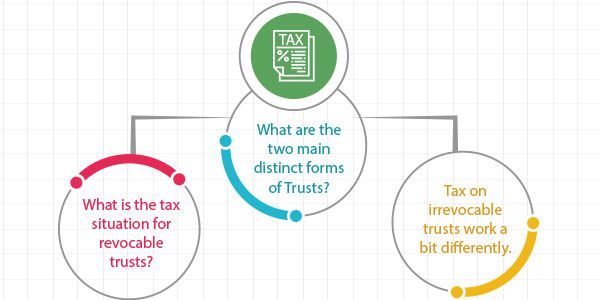Trusts make an important portion of your estate planning and overall wealth portfolio.
The availability of several types of trusts, and their liabilities to become taxable in various ways and forms, make it very difficult to choose a trust set up, that you will be forever comfortable with.
Usually trusts are made to contain huge amounts of wealth and property, and a full lay out of their usability. Touches of mistakes, here and there, will end up incurring big losses, and tax implications.
However, if you are the beneficiary, then you might not be facing most of the tax problems, especially when you are under a revocable trust.
But with an irrevocable trust, the whole scene can be different, with you facing big taxes, during the distribution process.
After a long time, OVLG is again encountering the topic of Trusts and Testamentary estate planning, to cater our clients’ demands and clear the confusions, in a whole new frame and conceptualization.
Our legal advisors are always ready to help you understand all the complications surrounding trusts, the way they are taxed, and how you can set up your own trust, to manage your precious wealth and assets in the best way possible.
In the meantime please search online to know about the differences between wills and trust, and which one should you choose for passing on your wealth and property to your heirs and beneficiaries, after you journey out of this life!
We definitely admit that it can be very difficult to differentiate between wills and trusts from a layman’s knowledge.
And, if you are truly in the dark about wills and trusts, then it’s preferred that you visit the referred post first, and then come back here to know the tax responsibility of the beneficiaries in a trust!
Otherwise the nomenclatures can become troubling to grasp!
What are the two main distinct forms of Trusts?
Before you know about the taxation on trusts, you should first know what are the types of trusts. As tax consequences are different for different types of trusts.
Before everything else, it is hereby declared that trusts are of two main types. The irrevocable trust and the revocable trust.
In an irrevocable trust, the grantor will place all the desired assets into the trust, and let the ownership be transferred to the trust and the trustee completely.
After that, the trust assets and income get distributed to the beneficiaries. Hence, the grantor loses all the power in the trust, and can’t make any modifications or changes to it as per law.
If however any changes are required, then that should be done with the consent of the trustee(s) and beneficiaries.
On the other side of the coin you have revocable trusts, which function differently than irrevocable trusts.
In this type of a trust, you have the power to manipulate your assets and property whenever you want, and however you want. A revocable trust always works in the favor of the grantor, with very little decision making power exercised by trustees and beneficiaries.
And, accordingly the taxation will work differently for these trusts.
What is the tax situation for revocable trusts?
You can very well see that revocable trusts are made highly flexible, with the grantor having full authority over the trust.
This very well means that the tax burden will also be mainly carried by the Grantor only.
Hence any income that the trust generates, or any asset that gets distributed, will be faced with tax consequences for the Grantor.
Commonly, a revocable trust does not enforce the beneficiary to pay taxes on any type of tax distributions.
However, if being a beneficiary you try to sell the assets that you received upon the property distribution from the trust, then you have to pay the Capital Gains Taxe
Moreover, a revocable trust becomes irrevocable, once the grantor passes away, and has no authority on the trust anymore. In such a case the beneficiary will have to pay the taxes on any distributions or income coming out of the trust.
But if there are any successor grantors then the trust will remain revocable!
Tax on irrevocable trusts work a bit differently:
As you have already got acquainted with irrevocable trust, let me clear the tax responsibility out for you. In this type of trust, the beneficiaries and the trustees are everything.
Once the grantor transfers all the assets into the irrevocable trust, the grantor loses all the interest in the property, and has no right over the transferred assets and wealth.
Hence, whatever income the trust generates, is either taxable to the trust itself, or the beneficiaries.
And, once the distributions take place from the trust, the beneficiary is totally liable to pay the taxes.
Therefore, you should always sit down with lawyers and legal advisors, to understand how should you deal with trusts properly, being a beneficiary.









